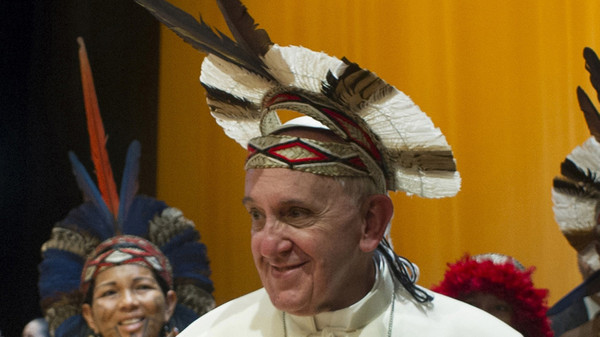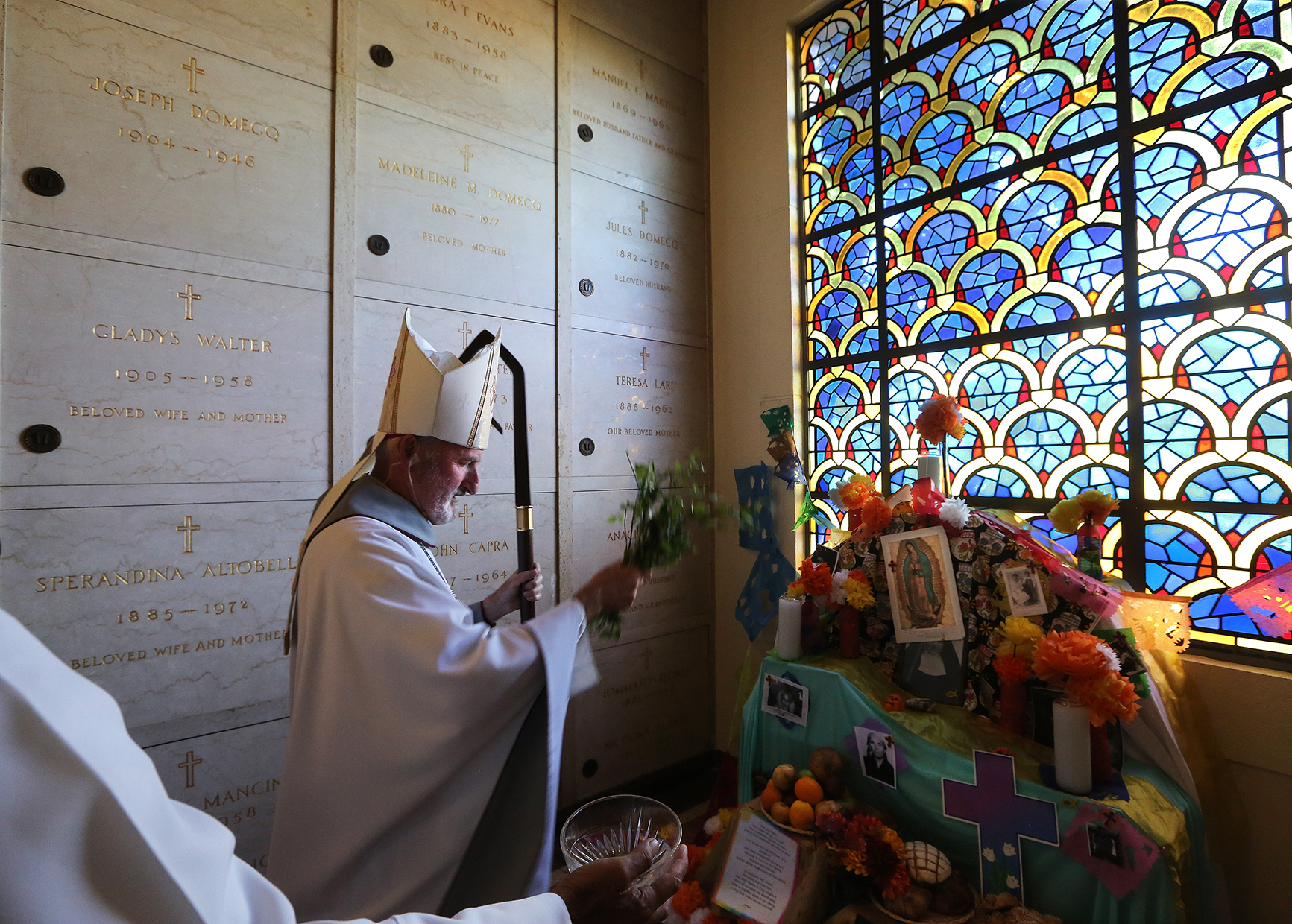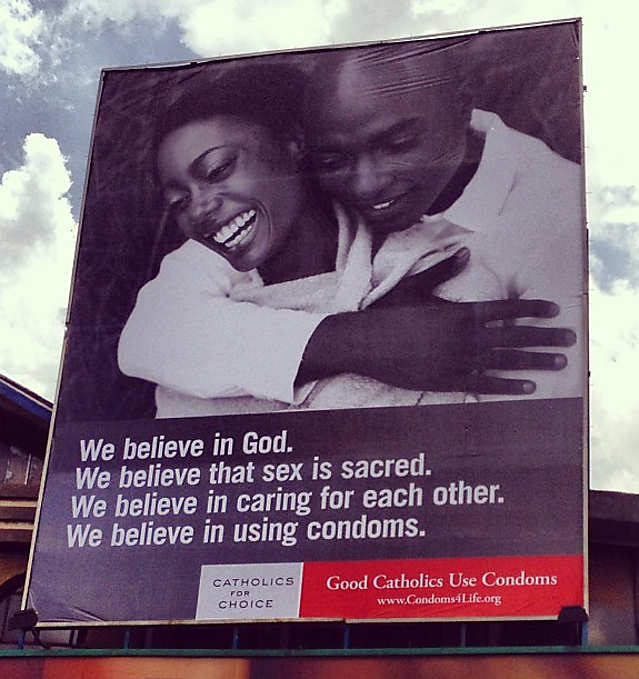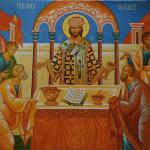
There is no worse cultural appropriator than the Catholic. It’s as if she’s never even been on Tumblr. She prays on rosary-beads (Italian appropriations of the Eastern European chotki, which is, arguably, a North African appropriation of the Hindu prayer rope). She regularly participates — without paying a modicum of lip-service to being an imperialist pig — in Filipino devotions. She worships before Mexican icons — which include symbolism rudely appropriated from the Aztecs. She hangs out with monks who appropriate the Jewish yarmulke by shaving the center of their heads (do they even care about the culturally-embedded significance of the symbol?) and mimics innumerable pagan traditions around her Christmas tree.
She is shameless in indulging the fruits of culture because her Church posits a value above culture, a value in the light of which every culture abdicates its dubious position as the ultimate expression of humanity and becomes, instead, a servant. This value, of course, is the divine.
Consider a privileged, wealthy, white man who enters a black Baptist church in a low-income neighborhood and joins in singing a hymn. One interpretation — and surely, this would be Tumblr’s verdict — is that the man could not possibly understand the pain and suffering of the African experience of America, and that, by appropriating the fruits of this culture he commits a grave offense. Another — and this would be the naive, religious interpretation of the same event — is that the true value of the hymn is not as an end but as a means. The hymn is for all mankind because the object of the hymn — Jesus — is for all mankind. Culture has become a vehicle towards something beyond any particular culture. Culture has become culture-for.
The existence of a God beyond all culture demands a radical generosity from every nation, that they split open and pour themselves out. What once belonged to the race and the nation becomes food for the journey, help for all, and means for attaining the universal end of every inhabitant of every nation — friendship with God. Culture-for-God gives itself away, abandoning itself to a humanity united by a common origin and destiny towards the divine.
 Of course, whenever our religious acts are only quasi-religious, in which we “try out” another culture because we think it groovy, or indulge the illusion that the culture of the other is the “real” thing while our own, saturated with familiarity, is a pantomime — we commit the offense of dilettantism. We indulge acts without objects and profound motions without profound intentions. It is in this sense that the critics of cultural appropriation are correct to shoot their online frown out to the hipsters donning sacred headdresses at Coachella. But resentment over cross-cultural use in genuinely religious acts is an attitude that values the purity of race over the universal salvation of mankind.
Of course, whenever our religious acts are only quasi-religious, in which we “try out” another culture because we think it groovy, or indulge the illusion that the culture of the other is the “real” thing while our own, saturated with familiarity, is a pantomime — we commit the offense of dilettantism. We indulge acts without objects and profound motions without profound intentions. It is in this sense that the critics of cultural appropriation are correct to shoot their online frown out to the hipsters donning sacred headdresses at Coachella. But resentment over cross-cultural use in genuinely religious acts is an attitude that values the purity of race over the universal salvation of mankind.

The Catholic especially, whose very name means universal, either rejects this idolatry or rejects her catholicity. It is no accident that, from Dias de los Muertos in Mexico to the crucifix of Chief Sitting-Bull, the Church remains an icon of cultural appropriation. Mother of the Nations to those who love her, she is a tyrant and seductress of the noble savages to those who detest her worldwide influence and her audacious, transforming embrace of everything she deems “good” in the cultures she evangelizes.
Love it or hate it, it’s in her nature: The Church is catholic precisely to the degree that, within her walls, all cultures abdicate their thrones and join in the service of the One God. Jealousy over cultural treasures in the Church (You cannot bless your house with chalk, you’re incapable of sharing the historical meta-narrative of Holy Poland!) is no sign of zeal, but of doubt in divine sovereignty. When culture becomes sacred, God becomes a household god, the Universal Church becomes a state church, and divine law is localized. Since St. Paul proclaimed the Unknown God as God over every god, the Catholic Church has grown as religion against the idols of the nations. The decline of the Catholic Church, then, is not characterized by a growth in rational unbelief, but by a return to the local god, in which every culture is justified in and isolated to their own beliefs, values, and traditions.
This is the story of our age. Without God and the values of religion, we look to culture to fulfill the religious aspirations of man — our need for sacred time, sacred space, total commitment, and total belonging. Culture surrogates God. It cannot be touched by those uninitiated in its mysteries, nor imitated by those unconnected with its cult. White girls should not have cornrows, nor should anyone call anything “tribal” who is not in a “tribe.” It is ineffable: It cannot be known outside of those who have experienced it firsthand, nor criticized by those who merely look in on it.
On the other hand, “culture” is a fundamentally extraneous thing to be shuffled off as soon as it interferes with the “real,” culture-less individual who exists under the trappings of culture: We laud those who escape the “traditional beliefs and values” of their “culture” — usually Jewish or Christian — and land safely on the side of Western values of free choice and individualism.

Culture is the ultimate good, until your culture says abortion is bad, and then culture is bad. Culture cannot be criticized or understood by those who are not embedded in its particular struggle and historical context — until that same culture doesn’t share the West’s opinions on homosexuality. Then it’s evil, without a doubt, and we may criticize it — even to the point of making extreme homophobia a tantalizing way to stick it to a douchey, identity-enforcing West. We work up a righteous sweat over scarves that look like the hijab while we approve of a foreign policy that introduces the Western logic of contraception to Muslim communities that oppose it. We promote the purity of world’s cultures while understanding that they would all be better as democracies. Culture, in short, is sacred, but only insofar as it conforms to the basic doctrines of our post-Christian, Western culture.
It is difficult not to see in this schizophrenia the aping of a lost belief: That of the sovereignty of God over all culture. In the light of God’s absolute transcendence, we have a real capacity for cultural criticism. We can say, with confidence, that it does not matter how historically important human sacrifice was to the Incas, there is a higher law than the law of culture, a law that judges human law and finds the Incas wanting. Cultural values do not justify themselves. Religion, in this respect, is liberation from tradition and freedom from the cult of ancestry, wherein evil is tolerated “as always having been” and ignorance persists under the guise of “custom.” With God as its goal, no traditional behavior can be justified in itself, but only the degree to which it helps or hinders the attainment of holiness.
Now that God is dead, we ape this view as the phantom limb apes the limb. The West and its values plays the part of the divine. An ambiguous slop of benefits and horrors spills from our beneficent, capitalistic, and “charitable” evangelization of the nations to the dubious gospel of post-Christianity: The nations are free to enjoy spicy food over Wonderbread, but if the laws of culture defy the laws Western liberalism, their claims to inviolability are rendered null. Instead of God, we have a Master-culture, a set of historically embedded-values and recent beliefs we earnestly take as absolute norms of human behavior — and to which every knee shall bow. Post-Christian Western liberalism, with its basic doctrines of individualism, materialism, and secularism, demands servant-status of the cultures it contacts without the common decency to declare itself a god.
And a god we will have, whether we want one or not — an absolute value to which all other values are subordinate. The only question is who, precisely, we will end up worshiping. In age such as this, genuine acts of religion are always acts of defiance, for they supplant the paltry god of current culture, and assert that God alone is Holy, God alone the value by which all others are ordered and judged.















